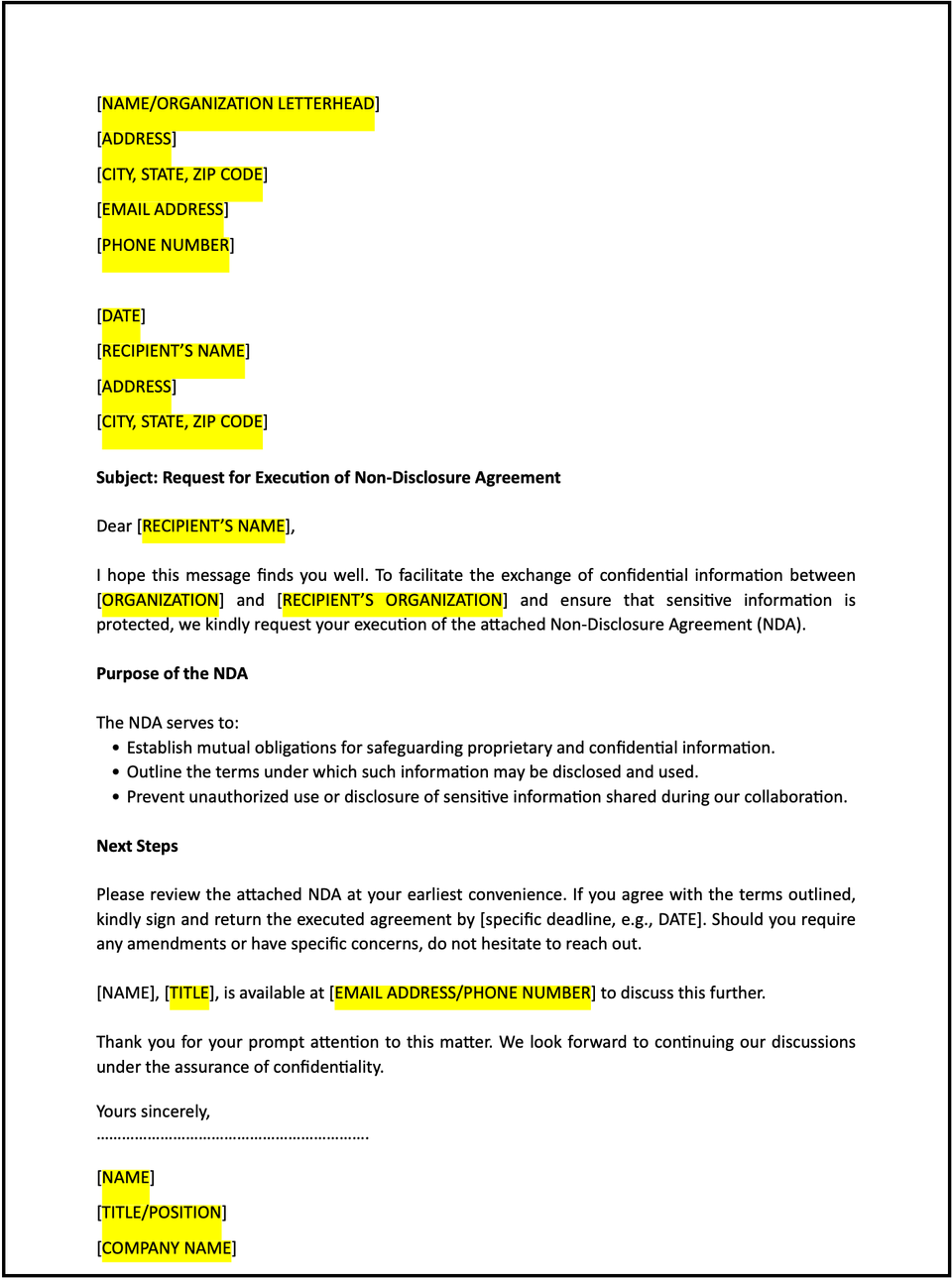Letter of request for execution of NDA: Free template

Letter of request for execution of NDA
A letter of request for execution of a non-disclosure agreement (NDA) is a formal communication used to initiate the process of signing an NDA between parties. This letter outlines the purpose of the NDA, provides context about the need for confidentiality, and includes instructions for review, signature, and return.
How to use this letter of request for execution of NDA
- Open with an introduction: Address the recipient respectfully and provide context for the business relationship or upcoming collaboration.
- State the purpose: Clearly communicate the intent to execute an NDA to ensure confidentiality during discussions or the exchange of sensitive information.
- Provide background: Briefly explain why the NDA is necessary, such as protecting trade secrets, intellectual property, or business strategies.
- Attach the NDA: Include the document for review and signature, ensuring it is clear and complete.
- Provide instructions: Specify how the recipient should sign and return the document, including deadlines or preferred submission formats.
- Offer assistance: Reassure the recipient that you are available to address any questions or provide clarifications about the NDA terms.
- Maintain a professional tone: Ensure the letter is clear, respectful, and focused on fostering a collaborative and secure relationship.
- Include contact information: Provide details for the recipient to respond or reach out with questions.
Benefits of using a letter of request for execution of NDA
This letter ensures a structured and professional way to request the signing of an NDA while fostering trust and compliance.
- Promotes alignment: Clearly communicating the need for an NDA ensures mutual understanding.
- Reflects professionalism: A well-crafted letter demonstrates respect and attention to detail.
- Encourages collaboration: Highlighting the importance of confidentiality fosters trust and openness.
- Builds trust: Transparent communication reinforces the security of shared information.
- Supports compliance: Addressing confidentiality requirements formally ensures legal and ethical obligations are met.
Tips for writing an effective letter of request for execution of NDA
- Be specific: Clearly reference the NDA, its purpose, and its relevance to the collaboration.
- Use professional language: Maintain a respectful and constructive tone to foster collaboration.
- Provide context: Briefly explain why the NDA is necessary and what it aims to protect.
- Highlight mutual benefits: Emphasize how the NDA protects both parties and ensures secure communication.
- Include actionable steps: Share instructions for reviewing, signing, and returning the NDA.
- Keep it concise: Focus on the essential points while ensuring the tone is professional and engaging.
Frequently asked questions (FAQs)
Q: What details should I include in this letter?
A: Include references to the NDA, its purpose, the attached document, and instructions for execution.
Q: Should I personalize the letter?
A: Yes, addressing the recipient by name and referencing the specific collaboration demonstrates attentiveness and professionalism.
Q: Who typically sends this letter?
A: Legal teams, compliance officers, or business owners typically send this letter.
Q: How formal should this letter be?
A: The tone should be professional, respectful, and focused on fostering collaboration.
Q: When should this letter be sent?
A: Send the letter before sensitive discussions or data exchanges occur to ensure confidentiality is secured.
Q: Can this letter include a summary of key NDA terms?
A: Yes, summarizing key terms can help the recipient understand the agreement before reviewing it in detail.
Q: Is acknowledgment from the recipient required?
A: While not mandatory, requesting acknowledgment ensures the recipient has received and is reviewing the NDA.
This article contains general legal information and does not contain legal advice. Cobrief is not a law firm or a substitute for an attorney or law firm. The law is complex and changes often. For legal advice, please ask a lawyer.


